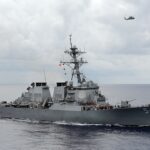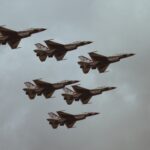The global defence industry plays a crucial role in maintaining national security and safeguarding the interests of nations around the world. It encompasses a wide range of activities, including the development, production, and sale of military equipment, as well as the provision of defence services and technologies.
The industry is characterised by intense competition among major players, with countries investing heavily in defence capabilities to ensure their sovereignty and protect against potential threats. Additionally, the global defence industry contributes significantly to economic growth, job creation, and technological advancements.
Importance of the defence industry
The defence industry not only contributes to national security but also stimulates economic growth by creating jobs, fostering innovation, and driving technological advancements.
Moreover, it serves as a deterrent to potential adversaries, maintaining a balance of power and promoting peace. In an increasingly interconnected and volatile world, the defence industry remains vital in safeguarding the interests and well-being of nations.
Economic Impact
In the United States the defence industry generates billions of dollars in economic output each year. In 2020, the industry’s sales activity contributed 18.8 percent of all non-food manufacturing revenue in the nation.
- Lockheed Martin, the largest defence contractor in the US, employs over 110,000 people in the US and generates over $50 billion in annual revenue.
In total, the US defence industry contributes an estimated $1.5 trillion to the US economy each year. This makes it one of the largest and most important sectors of the US economy.
Key players in the defence industry
The defence industry is a highly competitive sector, with several key players dominating the global market. These companies are known for their expertise in developing advanced military technologies and providing comprehensive defence solutions.
Some of the prominent players in the defence industry include Lockheed Martin, Boeing, BAE Systems, Northrop Grumman, and Raytheon. These companies have a strong presence in multiple countries and collaborate with governments to enhance national security.
They invest heavily in research and development to stay at the forefront of innovation and maintain their competitive edge. With their cutting-edge technologies and extensive experience, these key players play a crucial role in shaping the global defence landscape.
Global Defence Expenditure
The global defence industry is experiencing significant trends in spending. As countries around the world face evolving security threats, defence budgets are increasing to ensure national security. One major trend is the shift towards modernising military capabilities, with a focus on advanced technologies such as artificial intelligence, cyber defence, and unmanned systems.
Additionally, there is a growing emphasis on international collaborations and partnerships to address shared security challenges. These trends in global defence spending reflect the need for countries to adapt to the changing nature of warfare and maintain a strong defence posture in an increasingly complex global landscape.
Factors influencing defence expenditure
Factors influencing defence expenditure can vary greatly depending on the country and its geopolitical situation. One of the main factors is the perceived threat level, as countries with higher perceived threats tend to allocate more resources to their defence budgets.
Economic factors also play a significant role, as countries with stronger economies are often able to invest more in their defence capabilities. Additionally, political factors such as alliances and international obligations can influence defence expenditure.
Lastly, technological advancements and the need to stay ahead in terms of military capabilities can drive defence spending. Overall, a combination of these factors shapes the decisions and priorities of countries when it comes to defence expenditure.
Technological Advancements in Defence
Emerging technologies in the defence sector
Emerging technologies in the defence sector are revolutionising the way countries protect their borders and ensure national security. From artificial intelligence and machine learning to unmanned systems and advanced weaponry, these technologies are reshaping the landscape of modern warfare. With the increasing use of drones, autonomous vehicles, and cyber defense systems, nations are able to gather intelligence, conduct surveillance, and respond to threats more efficiently and effectively.
Furthermore, emerging technologies are also enhancing the capabilities of soldiers on the ground, providing them with advanced communication systems, wearable technology, and augmented reality tools.
As the global defence industry continues to evolve, it is crucial for countries to stay at the forefront of these emerging technologies in order to maintain a competitive edge and safeguard their national interests.
We have seen how the use of unmanned drones have influenced and in some cases won wars around the world. From the use of the Turkish Bayraktar TB2 drones in Syria and Ukraine to the use of hypersonic missiles used somewhat indiscriminately by Russia.
Challenges and opportunities in adopting new technologies
The defence industry faces numerous challenges and opportunities in adopting new technologies. One of the main challenges is the rapid pace of technological advancements, which requires defence organisations to constantly update their systems and capabilities.
This can be a costly and time-consuming process. Additionally, there is a need to ensure the security and reliability of these new technologies, as they can be vulnerable to cyber threats. However, embracing new technologies also presents opportunities for the defence industry. It allows for improved efficiency, enhanced situational awareness, and increased operational effectiveness.
By leveraging advancements in areas such as artificial intelligence, robotics, and data analytics, defence organisations can gain a competitive edge and better protect national security interests. Overall, navigating the challenges and capitalising on the opportunities in adopting new technologies is crucial for the defence industry to stay ahead in an ever-evolving global landscape.
Geopolitical Factors Affecting the Defence Industry
Regional conflicts and their impact on defence
Regional conflicts have a significant impact on the defence industry globally. These conflicts create a demand for advanced military equipment and technologies, leading to increased production and sales for defence companies. Additionally, regional conflicts often result in countries increasing their defence budgets to strengthen their military capabilities, further driving the growth of the defence industry.
Moreover, these conflicts also drive innovation in the defence sector as countries strive to develop new strategies and technologies to gain a competitive edge. Overall, regional conflicts play a crucial role in shaping the global defence industry and driving its growth and development.
Alliances and partnerships in the defence sector
Alliances and partnerships play a crucial role in the defence sector, enabling countries to enhance their military capabilities and address common security challenges. In today’s globalised world, no country can single-handedly tackle complex defence issues. Collaborative efforts between nations foster information sharing, technology transfer, and joint research and development, leading to the creation of cutting-edge defence systems. These alliances also promote interoperability among armed forces, allowing for seamless coordination during joint military operations. Furthermore, partnerships in the defence sector contribute to economic growth by creating opportunities for defence industries to collaborate and innovate. Overall, alliances and partnerships are essential for maintaining global security and fostering peace.
Political and economic factors influencing defence strategies
Political and economic factors play a crucial role in shaping defence strategies on a global scale. Governments around the world must carefully consider the geopolitical landscape and the potential threats they face when formulating their defence policies. Additionally, economic factors such as budget constraints and resource allocation also impact defence strategies.
The interplay between political and economic considerations creates a complex environment in which defence decisions are made. By understanding and analysing these factors, countries can develop effective defence strategies that address both their national security needs and their economic capabilities.
Defence Procurement and Supply Chain
Procurement processes in the defence industry
Procurement processes in the defence industry play a crucial role in ensuring the acquisition of necessary resources and capabilities to support national security. These processes involve the identification of requirements, the solicitation of bids from potential suppliers, the evaluation of proposals, and the selection of the most suitable contractors.
The complexity and scale of defence procurement projects require careful planning, coordination, and oversight to ensure transparency, efficiency, and cost-effectiveness. Additionally, procurement processes in the defence industry often involve collaboration with international partners and adherence to strict regulatory frameworks.
Overall, effective procurement processes are essential for maintaining a strong and capable defence sector that can effectively respond to evolving threats and challenges.
Supply chain management in defence
Supply chain management in defence plays a crucial role in ensuring the smooth and efficient operation of the global defence industry. With complex and interconnected networks spanning across various countries, managing the supply chain becomes a challenging task.
From sourcing raw materials to delivering the final products, every step of the supply chain needs to be carefully coordinated to meet the demands of defence organisations. Effective supply chain management helps in minimising costs, optimising inventory levels, and ensuring timely delivery of critical equipment and resources.
It also plays a vital role in enhancing the overall readiness and effectiveness of defence forces. By implementing advanced technologies and adopting best practices, defence organisations can streamline their supply chain processes and improve their operational efficiency.
Challenges in defence procurement and supply chain
The defence industry faces numerous challenges in procurement and supply chain management. One of the major challenges is the complexity of the procurement process, which involves multiple stakeholders, strict regulations, and the need for high levels of security.
Additionally, the defence industry often deals with long lead times and unpredictable demand, making it difficult to effectively manage the supply chain.
Another challenge is the reliance on a limited number of suppliers, which can lead to vulnerabilities and disruptions in the supply chain. To address these challenges, defence organisations are increasingly adopting advanced technologies, such as artificial intelligence and blockchain, to improve procurement and supply chain efficiency and enhance security measures.
Future Trends in the Global Defence Industry
Shift towards autonomous systems
The global defence industry is undergoing a significant shift towards autonomous systems. With advancements in technology, countries around the world are increasingly investing in the development and deployment of unmanned vehicles, drones, and robotic systems for various defence purposes.
These autonomous systems offer several advantages, including enhanced surveillance capabilities, improved operational efficiency, and reduced risk to human personnel.
Furthermore, autonomous systems have the potential to revolutionise military strategies and tactics, enabling faster response times and greater precision in combat situations.
As a result, defence organisations are actively exploring and adopting autonomous technologies to stay ahead in an ever-evolving global security landscape.
Cybersecurity challenges in defence
Cybersecurity challenges in defence have become increasingly prominent in recent years. With the rapid advancement of technology, the defence industry has become more reliant on digital systems and networks, making it vulnerable to cyber attacks.
These attacks can range from stealing sensitive information to disrupting critical infrastructure. As a result, governments and defence organizations around the world are investing heavily in cybersecurity measures to protect their assets and ensure the integrity of their operations.
However, staying ahead of cyber threats remains a constant challenge, as hackers continue to evolve their tactics and exploit vulnerabilities.
The defence industry must continuously adapt and enhance its cybersecurity capabilities to effectively defend against these ever-changing threats.
Role of artificial intelligence in defence
Artificial intelligence (AI) has emerged as a game-changer in the defence industry, revolutionising the way military operations are conducted. With its ability to process vast amounts of data and make real-time decisions, AI has become an indispensable tool for enhancing situational awareness, improving decision-making processes, and optimising resource allocation.
From autonomous drones and unmanned vehicles to predictive analytics and cybersecurity, AI is being leveraged across various domains to strengthen national security and streamline defence operations.
The role of AI in defence extends beyond just automation; it has the potential to transform the entire landscape of warfare, enabling faster response times, more accurate targeting, and enhanced mission success rates. As the global defence industry continues to evolve, the integration of AI technologies will play a pivotal role in shaping the future of defence strategies and capabilities.Next Steps As the global defence industry continues to evolve and adapt to new challenges, it is crucial for stakeholders to stay informed and connected.
To gain further insights and stay up-to-date with the latest developments, visit Insight Defence at https://insightdefence.com/. This comprehensive platform offers a wealth of valuable information, analysis, and expert opinions on various aspects of the defence industry.
By actively engaging with Insight Defence, you can enhance your understanding of emerging trends, technological advancements, and geopolitical dynamics that shape the future of defence. Don’t miss out on this opportunity to be at the forefront of industry knowledge and make informed decisions for the next steps in your defence-related endeavours.
Visit https://insightdefence.com/ today and join the global defence community in shaping a secure and prosperous future.






